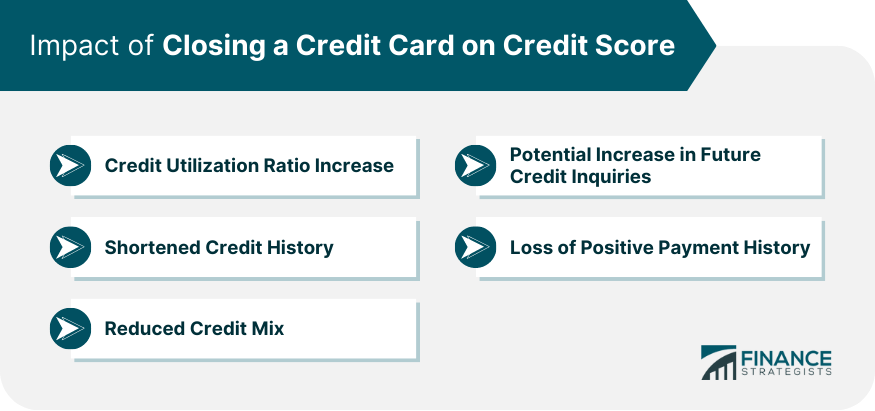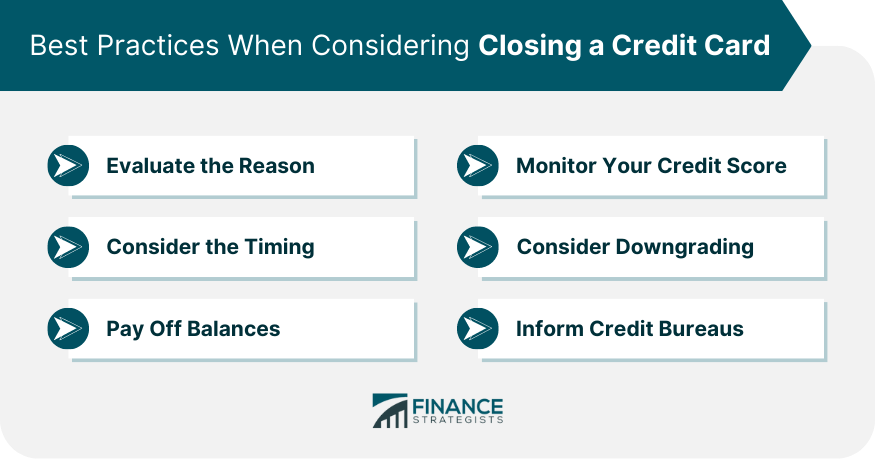Does Closing a Credit Card Hurt Your Credit Score?
Closing a credit card can impact your credit score in several ways. One of the most immediate effects is on your credit utilization ratio, which is the percentage of available credit you're using.
By closing a card, you decrease your overall credit limit. If you have balances on other cards, this action can raise your utilization rate, which can negatively affect your score.
Moreover, if the card you're closing is one of your older accounts, it could decrease the average age of your credit history, another key factor in credit score calculations.
However, the decision to close a card shouldn't be taken lightly. While reducing credit utilization and potentially shortening credit history length can lower scores, there are valid reasons to close a card, such as avoiding high fees or managing spending habits.
It is essential to consider both the short-term and long-term implications of such a decision on your financial profile.
Impact of Closing a Credit Card on Credit Score
Closing a credit card can have several impacts on your credit score:
Credit Utilization Ratio Increase
Your credit utilization ratio is the percentage of your available credit that you're using. When you close a card, you reduce your overall credit limit.
If you have balances on other cards, your utilization ratio can increase, which might negatively affect your score. It's generally recommended to keep this ratio below 30%.
Shortened Credit History
The length of your credit history, which includes the age of your oldest account and the average age of all your accounts, contributes to your credit score.
Closing an older credit card can potentially decrease the average age of your accounts, leading to a drop in your score.
Reduced Credit Mix
Lenders prefer to see that borrowers can handle a variety of credit types. If you close a credit card and it reduces the diversity of your credit accounts (e.g., you no longer have any revolving credit), it can slightly impact your score.
Potential Increase in Future Credit Inquiries
If you close a card and later decide to open another to replace it, the new credit application will result in a hard inquiry on your credit report. Hard inquiries can temporarily decrease your credit score.
Loss of Positive Payment History
If the card you're closing has a long history of on-time payments, you're potentially losing a positive influence on your score. However, closed accounts with positive payment history can remain on your report for up to 10 years.

Understanding Credit Utilization
Credit utilization is a measure of how much of your available credit you are using. It is calculated by dividing your current credit card balances by your credit card limits.
When you close a credit card, you reduce your overall available credit. If you have balances on other cards, this can increase your credit utilization rate.
A higher credit utilization rate is seen as a red flag by credit scoring models. It suggests that a consumer may be overly reliant on credit, indicating potential financial instability.
As a result, a rise in credit utilization, especially one that moves you above the 30% threshold, can lead to a decrease in your credit score.
Effect on Length of Credit History
The length of your credit history contributes to 15% of your FICO score. It considers both the age of your oldest account and the average age of all your accounts.
Lenders view consumers with longer credit histories as less risky because they have a track record that indicates their reliability. If you close one of your older credit cards, it might bring down the average age of your accounts.
For example, if your oldest card is 20 years old, and the rest of your accounts are relatively new, closing that older account can significantly reduce the average age.
A younger credit history gives lenders less data to evaluate. As such, closing an older account can lead to a dip in your score because it might suggest that you are a riskier borrower than your previous longer history indicated.
Reduction in Types of Credit
Credit mix, or the variety of credit accounts you have, plays a role in your credit score. Lenders like to see that borrowers can handle different types of credit, from revolving accounts like credit cards to installment loans like mortgages or auto loans.
If you close a credit card and it's one of only a few different types of credit you have, it could negatively impact your score. While this factor isn't as heavily weighted as others, a diverse credit profile can still benefit your overall credit health.
Best Practices When Considering Closing a Credit Card
When pondering the closure of a credit card, take a moment to reflect on the implications it might have on your credit score. Here are some best practices to consider:
Evaluate the Reason: Are you closing the card to simplify your finances, avoid fees, or reduce the temptation to spend? If your reason aligns with better financial health, it might be worth the potential short-term credit hit.
Consider the Timing: If you plan to apply for a major loan or mortgage soon, it might be wise to hold off on closing the card until after.
Pay-Off Balances: Before closing the credit card, make sure to pay off any outstanding balances. Leaving unpaid balances on the card can lead to continued interest charges and potential negative impacts on your credit score.
Monitor Your Credit Score: After closing the credit card, keep a close eye on your credit score. Use reputable credit monitoring tools to track any changes and ensure that there are no unexpected drops in your score.
Consider Downgrading: Some credit card issuers allow you to downgrade to a no-fee or lower-tier card within the same card family.
This way, you can maintain a positive credit history with the issuer without the burden of high fees or unwanted features.
Inform Credit Bureaus: If you decide to close the credit card, inform the credit bureaus of your decision to avoid any confusion in your credit report.
Verify that the account is reported as "closed by consumer" to ensure it doesn't appear as a negative action taken by the issuer.

Conclusion
Closing a credit card can have various impacts on your credit score, primarily concerning your credit utilization ratio and the length of your credit history.
By closing a card, you reduce your available credit, potentially increasing your utilization rate, which can negatively affect your score.
Additionally, if the card is one of your older accounts, it could decrease the average age of your credit history, leading to a drop in your score.
If you choose to close the card, consider paying off any outstanding balances and monitoring your credit score closely afterward. Alternatively, exploring options to downgrade the card or negotiating with the issuer for better terms may be beneficial.
Ultimately, making an informed decision based on your financial goals and circumstances is key when considering closing a credit card to maintain a healthy credit score.
Does Closing a Credit Card Hurt Your Credit Score? FAQs
Yes, closing a credit card can impact your credit score immediately, especially if it affects your credit utilization ratio.
Closing a credit card can affect your credit utilization ratio and potentially shorten your credit history, both of which can lower your credit score.
Not necessarily. If there are valid reasons to close the card, such as avoiding fees or improving financial management, it may be worth the potential short-term credit impact.
It depends on your individual circumstances. If the card has a negative payment history or you have multiple credit cards with high balances, closing it may have a positive impact.
To minimize negative effects, consider paying off balances before closing the card, monitor your credit utilization, and explore alternatives like downgrading the card to a no-fee option within the same issuer.
True Tamplin is a published author, public speaker, CEO of UpDigital, and founder of Finance Strategists.
True is a Certified Educator in Personal Finance (CEPF®), author of The Handy Financial Ratios Guide, a member of the Society for Advancing Business Editing and Writing, contributes to his financial education site, Finance Strategists, and has spoken to various financial communities such as the CFA Institute, as well as university students like his Alma mater, Biola University, where he received a bachelor of science in business and data analytics.
To learn more about True, visit his personal website or view his author profiles on Amazon, Nasdaq and Forbes.











